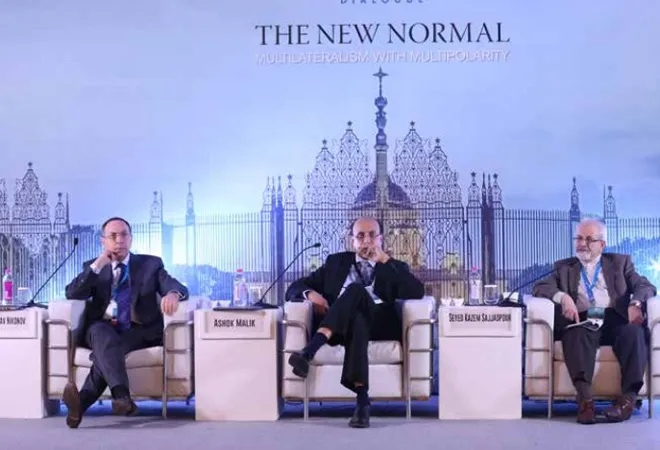-
CENTRES
Progammes & Centres
Location
With the India–US dynamic and bilateral strategic engagements with West Asian powers increasing significantly, direct policy outcomes will become more important between India and West Asia.

Raisina Dialogue 2017 offered a rare chance for an all-encompassing debate on possibly the most pertaining global topic of interest: West Asia (or the Middle East, as most refer to it). Much of literature and academia consumed on West Asia comes from a lens of studies conducted by Western institutes in English language, more than often sidelining local academic and scholarly views from Tehran, Kabul, Riyadh and other neighbouring regions. One of the reasons for the success of the panel on “The West Asian Paradigm” and its mindful yet open debate was perhaps the lack of a direct Western perspective.
Speaking at the dinner panel on the sidelines of Raisina Dialogue, Iran’s Deputy Foreign Minister Seyed Kazem Sajjadpour and Russia’s Chairman of State Duma Committee on Education Vyacheslav Nikonov looked into predominantly grey areas in the fractured political and social structures of the region.
The Iranian foreign minister highlighted the crowded “interventionist” space in the region’s affairs, describing three categories of actors that he believes operate in region: global actors, regional actors and transnational actors. Keeping in mind that both Iran and Russia are collaborating in aiding the Syrian regime of Bashar al-Assad, Sajjadpur’s comments perhaps presented a rare glimpse into the fact that Tehran may not be very comfortable with a long-term military presence of Moscow in the region.
From an Indian perspective, whether the three regional poles of West Asia—Israel, Iran and Saudi Arabia — like it or not, India’s interests via demographics and economics will be part of the dynamics. While New Delhi’s posture in the region is correctly non-interventionist, a policy that is expected to survive for a long period, the reality of protecting the interests of more than eight million of its citizens working in the larger West Asia region—a population responsible for more than $50 billion in annual remittances — will push policy towards “challenge management” more.
Until now, a lot of challenge management in the global sphere for India has been done more than often in the dance with Russia. While this is slowly changing, with the India– US dynamic and bilateral strategic engagements with West Asian powers increasing significantly, direct policy outcomes will become more important between India and West Asia than just multilateral spheres, and clearly, both Russia and Iran — one a regional power and the other a global actor — will have important roles to play. However, of course, Iran has a distinct advantage of being a power that is not overtly reliant on foreign actors but is largely militarily and economically self-sufficient.
With high-level representations from both Russia and Iran, the panel delved into a more important question: What is Russia’s end game in Syria? And Nikonov’s answer was quite straightforward: to make sure the tentacles of Islamist jihad do not spread in Central Asia and Russia’s more restive regions in the south.
Russia’s official position is that the fate of Syria should be decided by the Syrian people, one way or another. — Vyacheslav Nikonov, Chairman, State Duma Committee on Education, Russia
The Russian representative explained that the strategy to align with Assad — who he called “a natural ally”— and perhaps even Iran has been led by the idea of backing the “strongest and the most legitimate” political force in the region.
Meanwhile, it was established at the panel that much of the debate on West Asia and India’s role in the same is lost in the global foreign policy circles and hidden in domestic foreign policy due to the hectic neighbourhood it finds itself in. Despite that, it is imperative to bring these debates into the public sphere to understand just how important India’s relations in West Asia are today, and how much more important they are going to become over the coming decade.
The views expressed above belong to the author(s). ORF research and analyses now available on Telegram! Click here to access our curated content — blogs, longforms and interviews.

Kabir Taneja is a Deputy Director and Fellow, Middle East, with the Strategic Studies programme. His research focuses on India’s relations with the Middle East ...
Read More +
Jonathan Phillips James E. Rogers Energy Access Project Duke University
Read More +